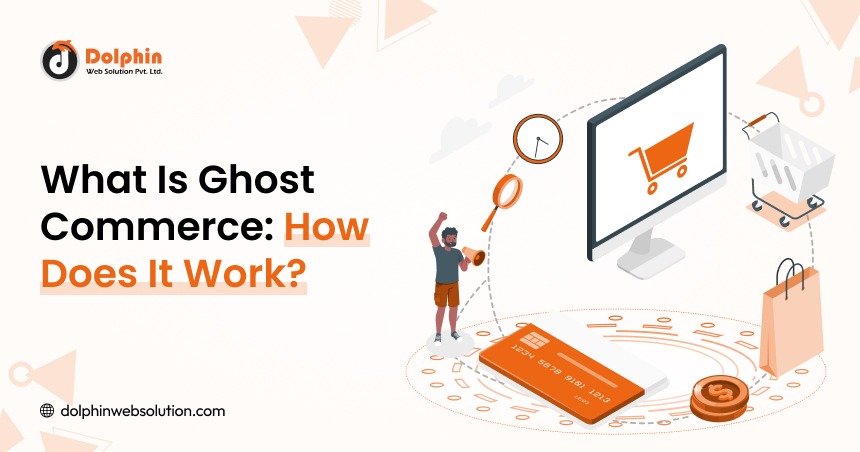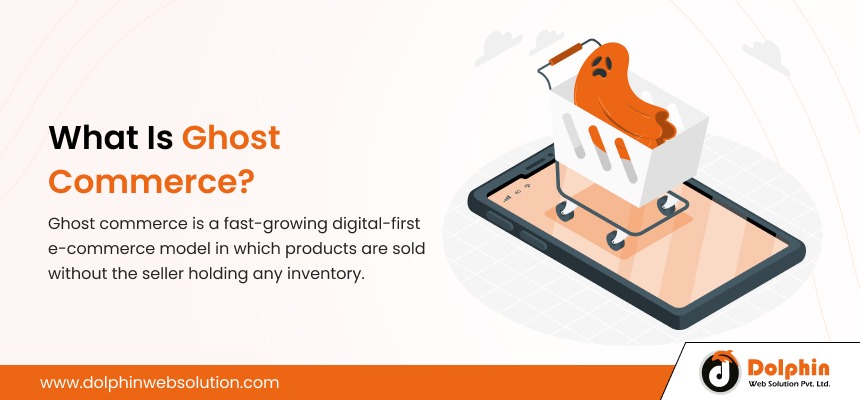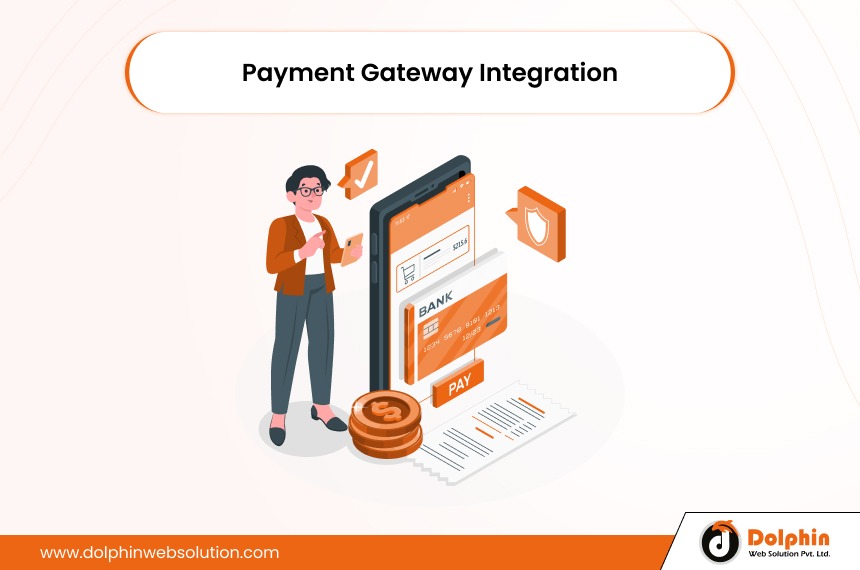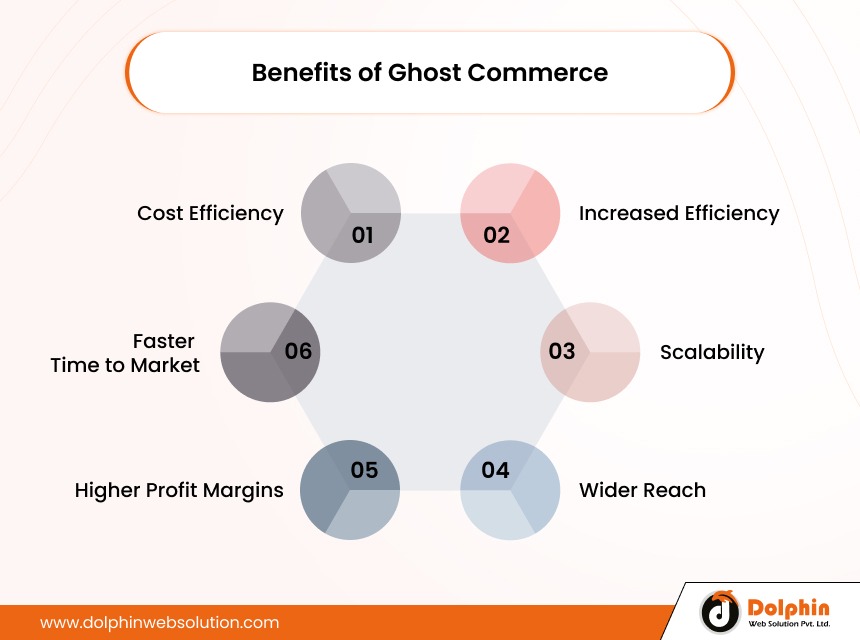What Is Ghost Commerce: How Does It Work? (Pros + Cons)

Table of Contents
Summary :
Ghost commerce is an e-commerce model that allows businesses to sell products online without holding inventory. By partnering with credible suppliers, popular influencers, and affiliates, ghost commerce businesses can efficiently bridge the gap between sellers and buyers. Reduced costs, increased efficiency, and scalability are some of the benefits Ghost Commerce offers. It also brings some challenges like product quality control, customer service, and dependency on third parties. To succeed in ghost commerce, businesses must carefully navigate these challenges, prioritize customer satisfaction, and embrace technology to stay competitive in the evolving digital landscape.
And the digital age has done too much to the way we shop, turning windows into screens. The biggest struggle for most retailers is managing and juggling inventory and shipping. Amidst all the crisis, a new breed of entrepreneurs created a different kind of commerce – one that’s sleek, strategic, and entirely intangible. They introduced the concept of “Ghost Commerce.” Not sure what is Ghost Commerce? Well, you aren’t alone.
Wouldn’t it be amazing to digitally sell your products without having to struggle with inventory management? That’s the basic concept behind Ghost Commerce. If you’re an entrepreneur with an existing digital store or want to create a digital presence, then ghost commerce could be your choice for retail reinvention.
Let’s start with the basics.
What Is Ghost Commerce?
Ghost commerce is a fast-growing digital-first e-commerce model in which products are sold without the seller holding any inventory. It is basically all digital, and one needs no physical storefront for such a business. What distinguishes it from regular e-commerce stores is the fact that it outsources critical operations like inventory management. The model runs on partnerships with suppliers, influencers, and digital platforms for sales.

- Influencers: The individuals or brands that have a strong brand presence and can promote products online to their audience.
- Affiliates: The brands or individuals who promote and sell products on a commission basis.
- Dropshippers: These are the third-party suppliers that store and ship products for the Ghost Commerce store.
The growing popularity of Ghost Commerce reflects its profitability and acceptance in the market. Have you seen influencers on Instagram share their favorite products in their posts? Well, that is also an example of ghost commerce.
Ghost commerce is a digital-first, inventory-less business model that grows on partnerships and customer experience. By leveraging online platforms and collaborating with suppliers, influencers, and affiliates, ghost commerce businesses can efficiently connect sellers and buyers without the need for physical inventory. Building a strong digital presence and prioritizing customer satisfaction are key to success in this model.
Ghost Commerce Vs. Traditional E-commerce
Although Ghost commerce and traditional eCommerce are methods of online retailing, they represent distinct approaches. Understanding the differentiation would help you embark on a rewarding endeavor.
1. Target Audience
Traditional e-commerce businesses cater to a larger audience with broader interests, whereas ghost commerce caters to a specific audience aligned to a niche market.
2. Customer Acquisition
Traditional e-commerce relies heavily on paid advertising, email marketing, and SEO to acquire clients. Ghost commerce rents on influencers, affiliate programs, and social media to drive target consumers and generate sales. It is also more cost-effective and demanding to create regular content and engage in other communications.
3. Inventory Management
Again, ghost commerce frees you from the headache of managing an inventory, reduces financial risk, and is less operationally complex than traditional e-commerce, which purchases stores and manages physical inventory.
4. Fulfillment Process
If you are running an e-commerce business, you need to think about order fulfillment, packaging, and shipping. You also have many responsibilities to address.
Ghost commerce involves outsourcing all this responsibility to suppliers or drop shippers. This can smooth out the operations, but it comes at the cost of less control over the customer experience.
4. Scalability, Risk, and Profit Margins
Traditional e-commerce is excellent for branding and controlling the customer experience but requires a significant upfront investment, and carrying inventory carries risks.
Ghost commerce is more streamlined and scalable, and the upfront investment is often less. However, it relies heavily on the performance of your partners, which impacts profit margins and customer retention.
Both business models have pros and cons. Your decision on whether to pursue ghost commerce or traditional e-commerce will depend on your particular consumer type, your company offerings, the resources you have available for investment, and your personal risk tolerance.
How Ghost Commerce Works
If you’ve decided that ghost commerce is the suitable business model for you, you might be curious to understand how ghost commerce operates. There is a process where multiple stakeholders move through a streamlined process to ensure that the model is executed correctly.
Successful ghost commerce involves careful planning and execution.Pick a profitable niche and claim strong online digital presence with a well-designed website and strong social media channels. With strategic marketing and sales plans you can attract new customers and drive conversions.Partner with suppliers who can ensure a timely order fulfillment and prioritize user experience.Integrate a secure payment gateway to facilitate transactions and offer convenient payment options.
Key Stakeholders in Ghost Commerce Business Operations
The stakeholders of your ghost commerce would help you operate, expand, and grow your business. As a business owner, the people you collaborate with will have a significant impact on your business’s direction.
- Ghost Commerce Business: You need to be very firm yet open to ideas when you decide on the core of your ghost commerce business. This would be the central entity where you select the product, decide on the marketing strategies, pick your suppliers, etc
- Suppliers: The team that provides the products to the customers. Choose suppliers who are reliable and have a similar business objective to yours. They must have similar interests and value customers just like you do.
- Influencers: People who are a part of the marketing team. They will promote and market your products on their channels. Thus, you at once make their audience yours. Pick influencers who are associated with the interests of your products and are popular among the audience.These days, influencers are celebrities who can drive an audience to any particular brand quickly.
- Affiliates: Some people can promote your product and charge a basic commission for it. You can use their platform and audience to sell your products and grow your brand on some petty commission.
- Payment Gateways: It is essential to integrate the right payment gateway to ensure all your payments are safe and your audience information is confidential. If your payment gateway fails for whatever reason, your business will earn a bad reputation.
Technology Infrastructure Ghost Business Needs
Technology plays a significant role in running a robust ghost business. The top technological aspects to ace your business are:
- E-commerce Platform:You would need a scalable platform to manage product listings, orders, and customer data supporting your business.
- Marketing Automation Tools: No business can scale without proper marketing. Automation tools allow you to evaluate the outcomes of your marketing campaigns and track performance to make calculated decisions.
- Analytics Tools: Integrating analytics tools with your platform helps you check your market performance. It will help you measure website traffic, customer behavior, and sales performance.
- Payment Gateway Integration: Process your transactions safely and ensure confidentiality by integrating a well-known payment gateway with your ghost commerce platform. This will add credibility and trust to your business.
- Customer Relationship Management (CRM) System: Integrate a trusted and feature-rich CRM system to assist your lead generation team. The system would manage customer interactions and process information to enhance customer satisfaction. Using an integrated CRM, you can easily manage these aspects.

Benefits of Ghost Commerce
The business model offers several advantages and is gaining popularity among budding entrepreneurs. If you know your digital game, then definitely try GhostCommerce.
Some benefits of ghost commerce are:

1. Cost Efficiency
Affordability and low investments are the most significant benefits of a ghost commerce business. The operational costs are reduced as inventory management, warehousing, and shipping are looked after by the supplier and not by the ghost commerce owner. In addition, since there are no physical products, the risk of product theft, damage, or obsolescence is eliminated. The saved cost can be re-invested in marketing, customer acquisition activities, and product development.
2. Increased Efficiency
As order fulfillment is outsourced to suppliers and customer service is handled by the CRM, streamlining ghost commerce operations and increasing efficiency becomes much more accessible. While your stakeholders take care of everything, you can focus on your core business and create strategies to elevate your marketing, branding, customer relationships, and other aspects. Automation of most processes further enhances the efficiency and productivity of the business.
3. Scalability
Ghost commerce offers excellent opportunities to scale. If you want to expand your product offerings without investing in additional inventory or infrastructure, you need to onboard new suppliers and tweak your marketing efforts. As the business demand grows, suppliers can adjust their production, allowing for rapid growth and adaptation to market changes.
4. Wider Reach
Businesses can expand their reach by tapping into new customer segments with their influencers and affiliates. It helps to develop brand visibility, attract a more extensive customer base, and generate better leads and conversions. Ghost commerce also gives access to a global clientele, enabling businesses to operate at a worldwide level.
5. Higher Profit Margins
Ghost commerce offers potentially higher profit margins than other models. Businesses can increase their profit margins by several folds, as ghost commerce eliminates the cost of inventory management, business operations, etc. Since your business is driven by the digital atmosphere, you can quickly adapt to changing market trends and customer preferences and optimize your collection to stay relevant. Ghost Commerce can lead to higher profit margins.
6. Faster Time to Market
With ghost commerce, you can quickly introduce new products to the market. Since you need no time for product development, manufacturing, or inventory setup, you can quickly capitalize on emerging trends and consumer demand.
This agility is significant in today’s fast-paced ecommerce environment.
These are some of the advantages that ghost commerce offers. By investing in setting up your ghost business, you explore an opportunity to grow your business, increase profitability, and improve efficiency while minimizing risks.
Challenges and Limitations
As we have seen, Ghost Commerce offers numerous advantages. However, it also presents several challenges that you need to address. We are discussing some of the common challenges that most ghost commerce businesses face.
1. Product Quality Control
The most significant concern when running ghost commerce is maintaining consistent product quality. Since the businesses don’t handle products directly, relying on suppliers often leads to variations in product quality. Due to subpar products, negative customer reviews can damage the brand’s reputation. Implementing strict quality control control measures and selecting reliable suppliers are crucial to mitigate this risk.
2. Customer Service
Excellent customer service can be a challenge in a ghost commerce model. Delays in products, defects, or returns require coordination between the business and the supplier. Companies must develop efficient complaint-resolution processes and provide clear communication channels for customers. Attending and resolving customer complaints can be a challenge when you venture into a ghost commerce business.
3. Dependency on Third Parties
The next challenge is reliance on suppliers, shipping carriers, and payment gateways. Any differences or issues with the partners can impact the business’s operations. Establishing solid and long-term relationships with credible partners minimizes business risks. Diversify the supplier base to mitigate dependency and offer timely delivery to customers.
4. Potential for Fraud
Counterfeit products or unauthorized transactions can be significant potential threats when running ghost commerce. To prevent fraud, you can implement reliable authentication and secure payment gateways. By carefully picking your business partners and implementing the proper safety measures, you can quickly expand your business.
5. Brand Reputation and Customer Trust
Ghost commerce runs on brand reputation and digital credibility. As there are many stakeholders involved, one mistake by anyone can ruin the brand image. Maintaining a solid brand reputation where multiple people are responsible for proper business execution can be a challenge.
Significant factors like negative reviews, social media criticism, etc., can ruin your business’s image.
Establish trust with your audience by maintaining transparent conversations. Offer excellent customer support and be consistent with product quality. Partnering with the right people who value your business objective and vision is vital.
Future of Ghost Commerce
Ghost commerce has excellent potential, and with the business arena evolving, the potential of the business can scale.
Blockchain technology offers enhanced security and transparency for ghost commerce businesses. By authenticating products and supply chain information, it can drive growth and profitability. Incorporating AI, augmented reality, and social commerce integration can further optimize operations and provide a superior customer experience. As the industry evolves, ghost commerce businesses that adapt to changing consumer trends, embrace technology, and build strong relationships will thrive and achieve long-term success.
Conclusion
Ghost commerce would redefine the retail landscape like never before.
The unique business model offers a lot of opportunities for entrepreneurs to expand their businesses. It does come with some challenges that may be an obstacle, but partnering with the right eCommerce firm can help you.
By understanding the core principles, benefits, and potential drawbacks of Ghost Commerce you can decide if you want to adopt the trend or not. As the digital commerce arena evolves, adapting to changing consumer trends, embracing technology, and prioritizing customer satisfaction are the key elements for success. Consider the pros and cons and implement effective strategies, to navigate the challenges in digital commerce and unlock the full potential of this innovative business model. Ghost commerce is an extension to eCommerce arena, offering entrepreneurs ease of running their business stress-free
Explore the possibilities of this eCommerce Development with Dolphin Web Solution for your business.

Hello!
Click one of our contacts below to chat on WhatsApp


